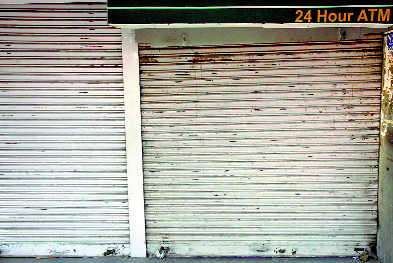
SHRINKING JOBS: The government needs to wake up to the problem. Reuters
Subir Roy
Over half way into its term, the Narendra Modi government is unable to deliver on its electoral promise of creating a large number of new jobs. In fact, the job situation is today likely worse than what it was under the earlier dispensation. This is particularly disturbing because India is seen to be an outlier even as the global economy is recovering and moving into a period of higher growth in both income and jobs.
What is going wrong?
So, what is going wrong?
1 Failing agriculture: The most obvious place to look for is the rural economy. If it is reviving, creating higher incomes for cultivators, then to that extent there will be greater demand for rural non-agricultural services which will speedily translate into more jobs.
But the first advance estimates of the agriculture ministry for 2017-18 project a fall in not just foodgrain output (likely to be down by 2.8 per cent over 2016-17) but also oilseeds and cotton. This is the result of not just the high base created by last year’s bumper crop but also uneven rainfall, with different areas suffering from drought and floods.
2 Small businesses hit: Then it is the micro and small businesses which hold out the maximum potential for quick job creation. But there, the government has shot itself in the foot by first going in for the disastrous demonetisation exercise (what got into its head it alone knows) and then compounding the agony at the bottom of the pyramid by introducing the goods and services tax (GST) which has proved to be hugely disruptive initially.
3 Big traders’ woes: Problems also abound in the rest of the economy comprising medium and large enterprises. The dominant theme there is of at best sluggish demand and spare capacity, creating a disincentive for private investment. Plus, large infrastructure projects are stalling and their troubled promoting companies are now being carted off for debt resolution under the bankruptcy code. Thus, the combined short-term outlook for both agriculture and manufacturing is bleak as is their job-creating potential.
What is the way out?
Now, what can be done to set things right? Reviving the slowing economic growth and job creation with a fiscal stimulus has been rejected by most experts. But the agricultural economy can get a fiscal boost without side effects. Fortuitously, Keynes's contention that if necessary, a government can dig holes and fill them up in order to create demand when an economy is in slack, ties up with an acute need of Indian agriculture.
1 Harvest rainwater: Better rainwater harvesting and watershed management can quickly improve agricultural productivity in rainfed areas. The government, by expanding the rural employment guarantee programme, can launch an agenda for creating, excavating and rejuvenating water bodies in every village and facilitating the natural flow of rainwater so that it reaches the water bodies and does not run off. This will put an additional income in the hands of impoverished rural wage earners. Plus, by making available enough water not just for man and animal but also cultivation, it will create a sustainable system of water management which will change the face of the most impoverished parts — arid and rainfed areas.
2 Recapitalise banks: As for the longer term, relaxations have been made in the GST regime and cash is slowly coming back into the informal economy of small businesses. It is, therefore, reasonable to expect that over time, the distress among the working poor, reflected in the hard times that the microfinance sector is facing, will ease. For the corporate sector and large investment projects to revive, banks have to be recapitalised so that they can get back into business and help the entire economy do so.
3 Skill development: Looking further, a lot hangs by skill development. This programme has been badly botched up, but it is axiomatic that if we are to address the dual shortages of skills and jobs, there has to be a hike in the supply of skilled workers. Skilling, in fact, has to be an ongoing process so that as technology changes, workers keep periodically coming back to upgrade their skills. A skilled worker who can handle mechanical tools must at some stage learn how to operate numerically controlled electrical tools. Instead of walking down rows of machines to keep an eye on them, a supervisor has to learn how to keep an eye by being seated at a TV screen monitor in a corner of the shop floor.
This brings us to the most exciting and challenging scenario at the higher end of the skills ladder. Smart machines and automation are rendering redundant many skilled engineers in the information technology industry. Those performing such tasks as writing codes, looking after systems maintenance and testing software are facing the threat of redundancy. Hence, large Indian software service companies have initiated huge reskilling programmes. A new age is dawning where engineers have to innovate to devise solutions for their customers through new processes that are largely automated.
Plus, there is the emerging high-risk vista of technology startups. This entire space needs people more skilled than graduate engineers who had till now been the foot soldiers of Indian software.
A somewhat similar situation is prevailing in Indian pharmaceutical companies which had over the decades become adept at making generic copies of medicines with their conventional chemistry skills. Now they need much more sophisticated skills to discover new molecules as the generics route is losing steam. A generics route is opening up in biotechnology, but superior skills are needed to create biosimilars, which are complex molecules.
So to create jobs, you need to walk on three legs — help farmers save rainwater, get banks on their feet again and make a dharma out of skill development.



























